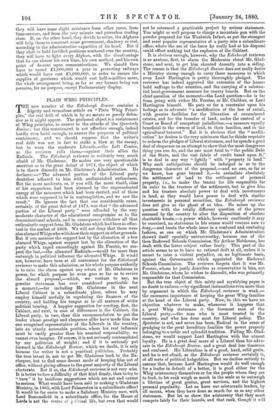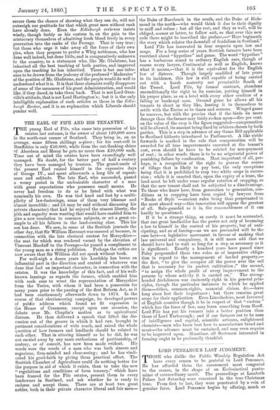PLAIN WHIG PRINCIPLES.
THE new number of the Edinburgh Review contains a fidgettv and tremulous article on " Plain Whig Princi- ples," the real drift of which is by no means so purely defen- sive as it might appear. The professed object is a restatement of Whig principles, in answer to the attacks of the Quarterly Review; but this restatement is not effective enough, indeed hardly even lucid enough, to answer the purposes of political controversy, and we should suppose that the writer's real drift was not in fact to strike a blow at the enemy, but to warn the moderate Liberals,—the Left Centre, as the reviewer calls them,—against their allies the Radicals. The Edinburgh reviewer is evidently very much afraid of Mr. Gladstone. He makes one very questionable assertion as to the great defeat of 1874, the object of which is to throw discredit on Mr. Gladstone's Administration. He declares :—" The advanced portion of the Liberal party doubtless adhered to him with undiminished enthusiasm. But the more moderate, or, if you will, the more timid, class of his supporters, had been alarmed by the unprecedented energy of the measures which had been carried, and of those which were supposed to be in contemplation, and we saw the result." He ignores the fact that one considerable cause, certainly, of the great defeat of 1874, was that " the advanced portion of the Liberal party " were offended by the very moderate character of the educational compromise as to the denominational schools, and in consequence withdrew all that enthusiastic support from Mr. Gladstone which had been so effec- tual in the contest of 1868. We will not deny that there were also alarmed Whigs who withdrew their support on other grounds. But if you measure the support lost by the alienation of a few alarmed Whigs, against support lost by the alienation of the party which raged exceedingly against Mr. Forster, we sus- pect the last,—the alienated Radicals,—would far more than outweigh in political influence the alienated Whigs. It would not, however, have been at all convenient for the Edinburgh reviewer to make this admission, as his whole purpose evidently is to raise the alarm against any return of Mr. Gladstone to power, for which purpose he even goes so far as to revive the absurd proposal,—which, we venture to say, no genuine statesman has ever considered practicable for a moment,—for including Mr. Gladstone in the next Liberal Cabinet in a subordinate place, where he may employ himself usefully in regulating the finances of the country, and holding his tongue as to all matters of wider political bearing. A happier suggestion for rending, first, the Cabinet, and next, in case of differences in the Cabinet, the Liberal party, in two, than this recommendation to put the leader whose prestige and eloquence alike have made him the one recognised representative of the Liberals in the country, into an utterly untenable position, where his real influence must be vastly greater than his nominal responsibility, we cannot even imagine. Of course, it is not seriously contemplated by any politician of weight ; and if it is seriously put forward in the Edinburgh Review, which we doubt, it is only because the writer is not a practical politician. Probably the true intent is, not to get Mr. Gladstone back to the Ex- chequer, but to find some decent mode of keeping him out of office, without giving offence to the great majority of the Liberal electorate. But if so, the Edinburgh reviewer is not very wise. It is better to face a difficulty of that kind firmly, than to try to " turn " it by insidious suggestions which are not and cannot be serious. What would have been said to making a Gladstone Ministry, in 1865, with Lord Palmerston in a subordinate office? It would be far easier to make a Salisbury Ministry now, with Lord Beaconsfield in a subordinate office, for the House of Lords is not the centre of political life, but even that would not be esteemed a practicable project by serious statesmen. You might as well propose to charge a mountain gun with the powder prepared for the Woolwich Infant, as put the strongest and most popular representative of a party into a subordinate office, where the use of the force he really had at his disposal could effect nothing but the explosion of the Cabinet. It is obvious enough, however, why the Edinburgh reviewer is so anxious, first, to alarm the Moderates about Mr. Glad- stone, and next, to get him shunted decently into a siding. The reason is that the Edinburgh Review does not really desire a Ministry strong enough to carry those measures to which even Lord Hartington is pretty thoroughly pledged. The reviewer has indeed approved the extension of the house- hold suffrage to the counties, and the carrying of a substan- tial local-government measure for county boards. But on the chief question of the moment—the Land question—he is far from going with either Mr. Forster, or Mr. Childers, or Lord Hartington himself. He puts so far a constraint upon his feelings as to advocate "a modification of the law of entail, with greater facilities for the liberation of encumbered estates, and for the transfer of land, under the control of a Court or Board of competent jurisdiction,—a measure equally beneficial to the owners of land, to their families, and to the agricultural-interest." But it is obvious that the " modifi- cation" he desires is the very minimum that he thinks requisite to redeem the pledges of Liberal statesmen, and he spends a good deal of eloquence on an attempt to show that the most dangerous thing you can do, and the one most fatal to " the public Debt of the State, and the vast fabric of credit based upon it," is to deal in any way " lightly " with "property in land." Why such anticipations should be indulged in as to the dangerous character of the proposal,—and no one, so far as we know, has gone beyond it,—to assimilate absolutely the settlement of land to the settlement of personal property, i.e., to make the tenant for life responsible for its value to the trustees of the settlement, but to give him and his trustees absolute power to deal with investments in land, as they would have power to deal with similar investments in personal securities, the Edinburgh reviewer does not give us the ghost of an idea. He mixes up the question with the totally different question of the power assumed by the country to alter the disposition of obsolete charitable trusts,—a power which, however cautiously it may be exercised, no statesman in his senses would venture now to deny,—and treats the whole issue in a confused and confusing fashion, as one on which Mr. Gladstone's Administration showed itself specially untrustworthy, because one of the then Endowed Schools Commission, Sir Arthur Hobhouse, has dealt with the latter subject rather freely. This part of the article seems to us to have no rational drift at all, unless it is meant to raise a violent prejudice, on no legitimate basis, against the Government which appointed the Endowed Schools Commission. The reviewer forgets that it was Mr. Forster, whom he justly describes as conservative in bias, not Mr. Gladstone, whom he wishes to discredit, who was primarily responsible for that Commission.
But the true object of this misty and mystifying paper is no doubt to enforce,—by significant insinuations even more than by argument in which the Edinburgh reviewer is weak,— the enormous importance of keeping the great Whig families at the head of the Liberal party. Now, to this we have no objection whatever to make, whenever it happens that a great Whig statesman is the foremost man of the Liberal party,—the man who is most trusted in the country, and who has done most for Liberal policy. The Spectator is not, and never has been, Radical in the sense of grudging to the great hereditary families the power properly belonging to a noble and splendid tradition. Failing Mr. Glad- stone, we would support Lord Hartington with the utmost loyalty. He is a great deal more of a Liberal than his advo- cate in the Edinburgh Review, and a great deal less timorous and confused. His Liberalism is of a good, hard, solid grain, and he is not afraid, as the Edinburgh reviewer certainly is, of all sorts of political hobgoblins. But we decline entirely to assume that, because Lord Hartington would do well enough for a leader in default of a better, it is good either for the Whig aristrocracy themselves or for the people whom they are to lead, to let rank weigh so much in the scale as to outweigh a lifetime of great genius, great services, and the highest personal popularity. Let us have our aristocratic leaders, by all means, when they have done as much for us as any other statesmen. But let us show the aristocracy that they must compete fairly for their laurels, and that rank, though it will secure them the chance of showing what they can do, will not outweigh our gratitude for that which great men without rank have already done. Even the Edinburgh reviewer insists wisely, though feebly as his custom is, on the gain to the aristocracy themselves of admitting fresh blood freely in every generation into the ranks of the Peerage. That is very true ; but those who urge it take away all the force of their own plea, when they propose to prefer a Whig nobleman, who has done well indeed, but done little, and is comparatively unknown to the country, to a statesman who, like Mr. Gladstone, has inherited all the best teaching of both parties, and improved upon the teaching he has inherited. There is but one infer- ence to be drawn from the jealousy of the professed" Moderates" of the position of Mr. Gladstone, and the people would do well to understand what it is. It is that these alarmists really disapprove of some of the measures of his great Administration, and would like, if they dared, to take them back. That is not Lord Gran- ville's attitude, that is not Lord Hartington's ; but it is the only intelligible explanation of such articles as those in the Edin- burgh Review, and it is an explanation which Liberals should ponder well.



































 Previous page
Previous page